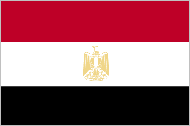Network Access in Egypt had been controlled by Telecom Egypt, which has monopolized the information and
telecommunications industry within Egypt in the past.
Along with Telecom Egypt,
Egypt’s
government with Egyptian National Communications and Information
Technology (CIT) in 1999 developed a strategic information
technology plan for the country.
However, during the past few years, many new players have
entered Egypt’s
information technology sector, resulting in several upgrades to its
network backbone, improving
Egypt’s network access.
Information Infrastructure (Stage 3)
The Cabinet IDSC Information & Decision Support Center (IDSC) and
the Supreme Council of Universities (FRCU) in collaboration with
Egypt Telecom are cooperatively running the internet backbone in
Egypt.
Egypt’s government identifies
information technology as the key to enabling private sector firms
and the government to operate efficiently.
[1]
Egypt’s
network backbone consists of a Transport Network SDH 3 Rings and a
Frame Relay/ATM network with packet switching and IP-based
technology for high speed access, and the use of Fiber Optic Cables.
This has been accomplished by adding equipment and increasing
the data rate through the upgrade of multiplexers.
This is the only fiber optic network in the region.
Internet Availability (Stage 3)
Internet availability is accessible country wide for those that have
access to personal computers in major urban areas of
Egypt. There are 4 million internet
users in 2006 up from 540,000 in 2001 according to the Arab Advisor
Group. In comparison to
other nations, Egypt
is one of the most advanced technologies enabled country in
Africa.
However compared to the rest of the world, Egypt is still a
developing country in the technology world.
Egypt
has become the largest internet market in
Africa. The
free internet initiative proposed by Egypt’s government has increased internet
availability to the people of
Egypt.
However, the affordability of personal computers for rural or
lower income residents has been a central limitation for those to
access the internet.
Internet Affordability (Stage 3)
Currently, internet users are able to access the internet with a
price of a phone call.
The free internet model commenced in Egypt in 2002
where many believed this free model will increase the number if
internet users in the country.
For example, Arabia.com offers users in
Egypt
with free internet access, with the price of a local call, once they
download their software.
Network Speed and Quality (Stage 2)
The free internet service has provided internet users in
Egypt
with a fast, reliable dial-up service.
However compared to the rest of the world, speed and quality
are still at the lower end of the spectrum.
Average dial-up and broadband speeds are 32-40 Kbbs.
There are 196 Internet Service providers; however there is a limited
number of ISPs that are Class A, all-inclusive provider.
Class A internet service provider resells bandwidth to other
Internet Service Providers.
Network Speed and Quality (Stage 2) (continued)
This bandwidth sharing by ISPs presents a danger where a failure on
the part of the Class A provider will disrupt services for many
customers as there is only a single point of failure.
Hardware and Software (Stage 2)
The major obstacle hindering the Egyptian population on accessing
the Internet and other network services is the cost of personal
computers. Personal
computers are a luxury item in
Egypt.
However, MCIT along with Telecom Egypt has
launched a PC for Every Home initiative model for public-private
partnership. It offers affordable, internet-enabled family computer
on installments. Since
the launch of the project late in 2002, the initiative improved
growth in both the local assembly and software industry as well. So
far over 65,000 PCs were purchased through the initiative.
“Egypt is a major
market for software development and this plan has the potential to
create tremendous opportunities for software developers in the
country”, said regional manager for ACCPAC International Inc., Marc
Van der Ven. Studies
have shown there are 160 software development houses in
Egypt
that employ 10,000 developers.
[2]
This potential of software development has open many doors in
the software world for Egypt’s users where software
packages are more readily available then before.
Service Support – (Stage 4)
Service support has benefited greatly with the deregulation and
privatization of the network / telecommunications industry in
Egypt.
Several smaller firms have entered the market to provide
services, which has increase competition. This competition has lead
to firms leveraging their customer service
to attract and retain customers.
Previously, controlled by the government Telecom
Egypt has adjusted to the new customer focused
market within
Egypt.
They are the largest provider for fixed-line provider in
Egypt
and provides the majority of Internet services.
They service
10.8 million customers and are aggressively improving, and upgrading
their internal systems to
provide better customer service.
For example, they recently signed with a leading software
vendor to provide their customers with an automated billing system
which will provide e-billing and convergent billing for their
customers.
[3]
They also offer support services from their websites where
customers can request support and usually get serviced in a short
amount of time.
[2]http://www.ameinfo.com/318.html
[3]
http://www.ameinfo.com/128819.html
 Egypt - Readiness for
the Networked World
Egypt - Readiness for
the Networked World